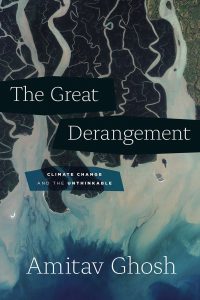Author Essays, Interviews, and Excerpts, Books for the News, Cartography and Geography, History and Philosophy of Science
Publishers Weekly on Amitav Ghosh’s The Great Derangement

Though perhaps best known in the United States for his fiction, Bengali writer Amitav Ghosh has previously published several acclaimed works of non-fiction. His latest book The Great Derangement: Climate Change and the Unthinkable tackles an inescapably global theme: the violent wrath global warming will inflict on our civilization and generations to come, and the duty of fiction—as the cultural form most capable of imagining alternative futures and insisting another world is possible—to take action.
From a recent starred review in Publishers Weekly:
In his first work of long-form nonfiction in over 20 years, celebrated novelist Ghosh (Flood of Fire) addresses “perhaps the most important question ever to confront culture”: how can writers, scholars, and policy makers combat the collective inability to grasp the dangers of today’s climate crisis? Ghosh’s choice of genre is hardly incidental; among the chief sources of the “imaginative and cultural failure that lies at the heart of the climate crisis,” he argues, is the resistance of modern linguistic and narrative traditions—particularly the 20th-century novel—to events so cataclysmic and heretofore improbable that they exceed the purview of serious literary fiction. Ghosh ascribes this “Great Derangement” not only to modernity’s emphasis on this “calculus of probability” but also to notions of empire, capitalism, and democratic freedom. Asia in particular is “conceptually critical to every aspect of global warming,” Ghosh attests, outlining the continent’s role in engendering, conceptualizing, and mitigating ecological disasters in language that both thoroughly convinces the reader and runs refreshingly counter to prevailing Eurocentric climate discourse. In this concise and utterly enlightening volume, Ghosh urges the public to find new artistic and political frameworks to understand and reduce the effects of human-caused climate change, sharing his own visionary perspective as a novelist, scholar, and citizen of our imperiled world.
To read more about The Great Derangement, click here.